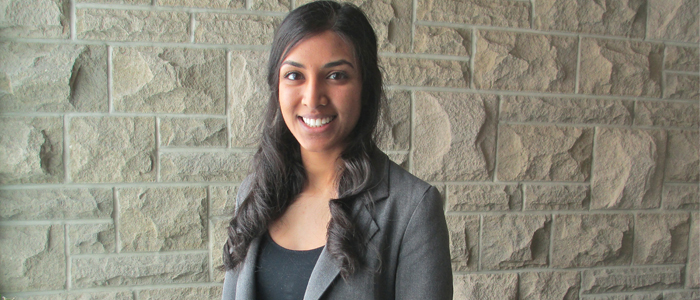Media
Contact
Communications Specialist
Faculty of Engineering
Spencer Engineering Building
Room 2072
Western University
Tel: 519-661-2111 ext. 87015
Email: engineeringcomms@uwo.ca
Chotalia presents business model at Hult Prize Competition in Dubai

Western Engineering News | March 25, 2015
By Jason Teakle
Shivani Chotalia, a fifth-year Green Process Engineering student, travelled to Dubai, United Arab Emirates earlier this month to participate in the sixth annual Hult Prize Challenge.
Under the theme, Early Childhood Education: The Unmet Need of the Century, the 2015 Hult Prize focused on building start-ups that provide sustainable, high-quality early education solutions to 10 million children under the age of 6 in urban slums and beyond by the year 2020.
Chotalia, along with her four Western teammates, presented a business plan focused on training women who are now providing care for children in urban slums to empower them with curriculum knowledge and business resources so they can start their own teaching and childcare-related businesses.
“The main problem with early childhood education in urban slums is though there is often daycare available, there is usually no focus on actual education for children,” explained Chotalia.
“These ‘Kiducators’ would receive support through training and consultancy services from a ‘Champion’ directly employed by our business,” said Chotalia. “The ‘Champions’ would be recruited from universities and cities close to the urban slums so that they understand the local cultural context and would complete a three-month training program.”
Though similar plans for providing early childhood education (ECE) in urban slums have been successful across the world, the group decided to try a new funding strategy apart from private donations to support its proposed ECE strategy.
“We are looking at running a whole daycare centre for more affluent families in other parts of urban areas,” explained Chotalia. “The proceeds from this facility would fund the training programs and resources needed by women living in poverty to receive ECE training and start businesses.”
Using this model, the group proposed training multiple cohorts of ‘Champions’ around the world – to reach an estimated 10 million children by 2020.
The trip to the Dubai competition allowed Chotalia and her group to connect with other students from across the world with an interest in social issues.
“There were lots of fantastic business models that students created,” she said. “While we can’t all win the $1 million-prize to launch our ventures, I’m confident that everyone who attended will go on to generate a strong impact in their careers.”
Despite not advancing to the final round in the competition, Chotalia is pleased with what her team has accomplished.
“I find the intersection of the not-for-profit and business sector really interesting – specifically, how qualities from both sectors can come together to have an effective impact over the long-term,” observed Chotalia. “We are very proud of what we created and the research and work we put into preparing for the competition.”

